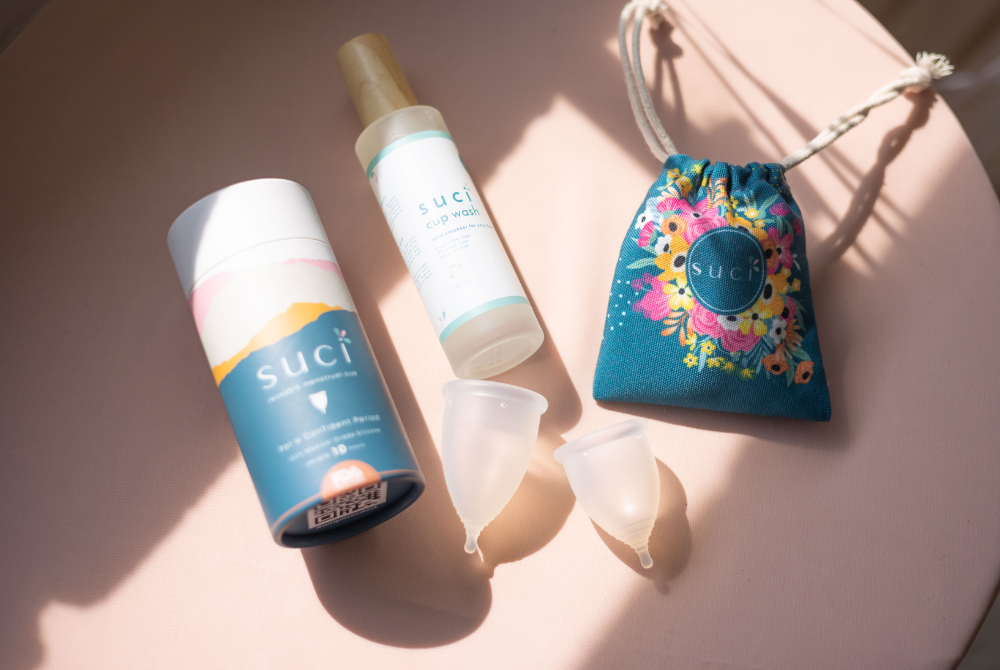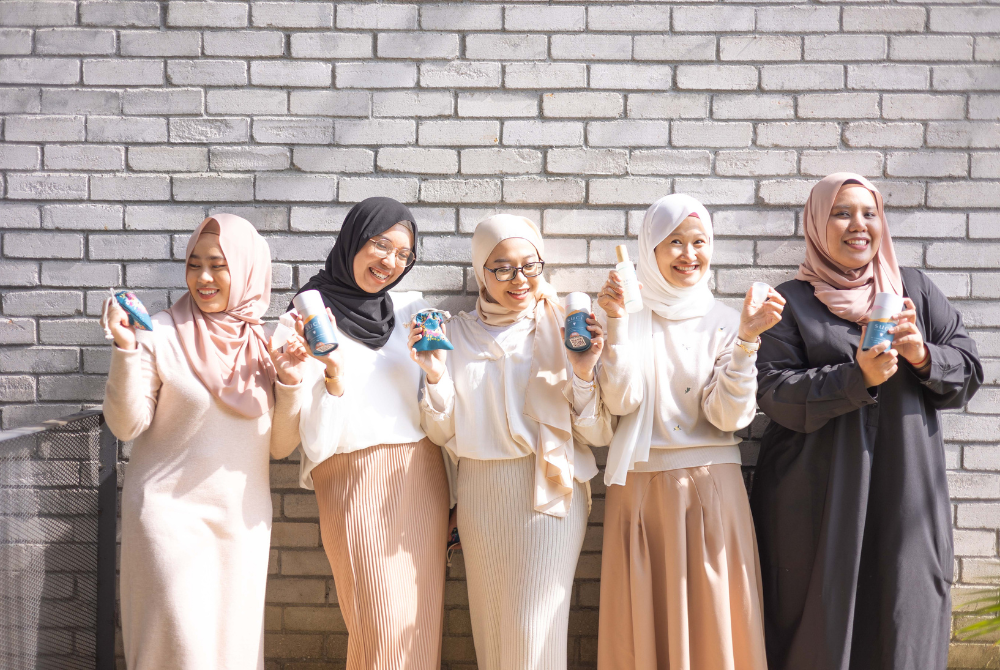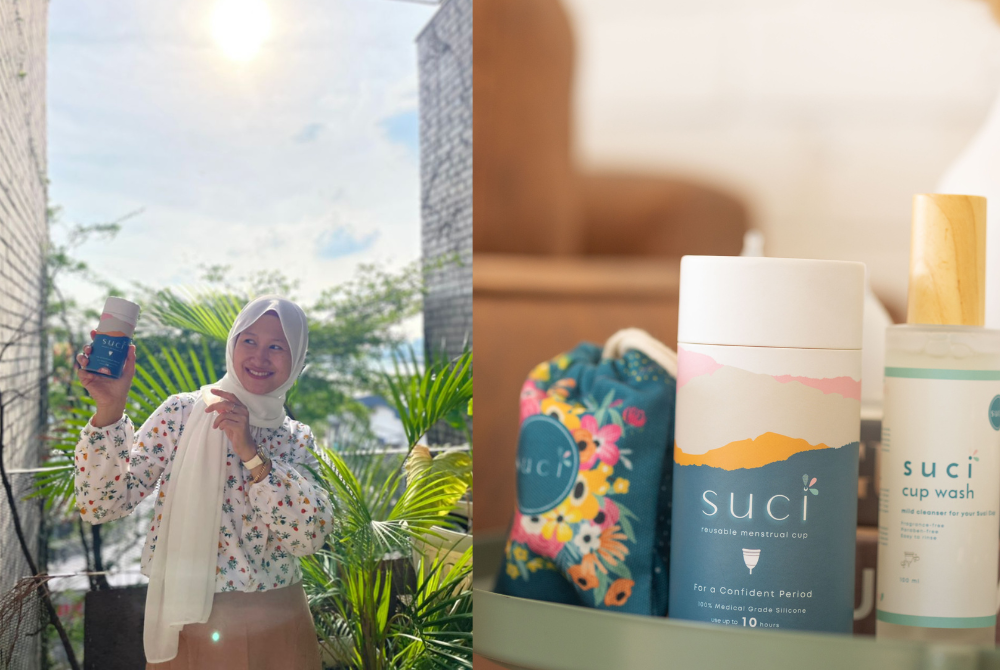Menstrual cups: Is it still a taboo?
Hajar Umira Md Zaki


What kind of menstrual myths do you often hear about? Is it the ghost who will get you if you don’t wash your pad after using? Or is it that you are forbidden to have cold drinks when you’re on your period?
As time flows, numerous myths have been created along with the world and technology evolution, which women’s menstrual hygiene care also listed together.
When it comes to menstrual hygiene kits, things like tampons or menstrual pads are something we typically use. While menstrual cups are heard of here, many are still confused as to how they are used.
To get deeper into the reality of wearing menstrual cups, whether is it harmful or either way, Consultant Obstetrics and Gynaecology, Infertility Specialist, Dr Maiza Tusimin and Suci Cup Malaysia Co-Founder, Nor Izzati Nordin explained more in an interview with Sinar Daily.
WHAT IS A MENSTRUAL CUP?
First and foremost, let’s go back to basics. Menstrual cup is medical grade silicon, which works as a tool that can be inserted into the vagina, where the purpose is to collect the period blood.
As the founder of Suci Cup, Izzati shared they have two types of menstrual cups which comes in two different sizes; Size A and Size B.
“Usually we would suggest Size B for women who experienced giving birth in normal delivery and Size A for caesarean delivery or single women.
“However, as human bodies are different, there are some exceptions here and there,” she said.
IS IT CONSIDERED A TABOO TO USE ONE?
From the point of view of a medical specialist, Dr Maiza didn’t refute the fact menstrual cups are considered taboo within the Malaysia’s community regardless of the racial status, especially among Malay Muslim families.
Topping the taboo or myth’s list is because the cup is related to the women’s menstrual and private parts.
“Most of the parents believe that we shouldn't be touching the private parts.
Apart from that, Dr Maiza added women are worried if they will be sexually aroused if they use the menstrual cups.
As for Izzati, when she started the menstrual cup business in 2020, she admitted had received numerous impactful comments from families, friends and strangers.
“Some of the comments we had in our social media before was "isn’t it painful?", or even "what about your virginity?".
“We used to receive those kinds of comments and were quite disappointed back then but when we started, we wanted to get the message across everyone,” she said.
Nevertheless, Izzati said as time goes time in two years she found the questions in their social media have shifted to something that is more positive that before.
“I think after two years our community has gotten better and the mindset of the people are more accepting,” she said.
Menstrual cups are not only limited to women who were married or giving birth, but girls who are not married also could use the menstrual cups, she added.
THE UPSIDE OF MENTSRUAL CUPS
Menstrual cups are not considered as something new in the community, it has been around since 1983 and Dr Maiza herself has been using the menstrual cup for almost three years.
Though the method of use might be eerie for some people, it does bring convenience and advantages.
“Pads, tampons and cups are not something new and the first thing that people look up to is the usage. Which one is the most convenient for them.
“Second would be the cost. For menstrual cups, yes the price is expensive but in the long run, like five years, the menstrual cups cost only RM80 to RM90 on average.
“However, to understand your body and your anatomy is the main important point. There’s nothing related to hymen and virginity,” she added.
Moreover, she said menstrual cups also come along with the FDA registered as the material was made by the high grade silicone where pads are not.
“It’s easy to clean up as well. After using the menstrual cup, you just have to pour the blood in the toilet and then wash it before reuse it.
“Hence, aside from being clean in terms of personal hygiene, it could save the water and clean the environment as well and prevent the toilet clogging,” she claimed.
For Izzati herself as the founder and also the user, it was like a life changing experience for her after using the menstrual cup.
“At first I was like, I’m not going to put that thing inside me but I know menstrual cups have zero waste and that is the best tool for period management.
“You don’t know how life changing it was and my husband also likes that I changed to the menstrual cup as there is no more period waste.
“It’s very clean and it changed my life. So I feel like we can’t be the only women who feel this way and we need more women to experience this,” she said.
Speaking in terms of the environment, Izzati previously used the reusable pad for her period and it used a lot of water- which her husband commented that it’s not saving much of the environment.
“By using the menstrual cup, it does help a lot actually than using the pads. Pads will take hundreds of years to decompose and the dump site will only be full with pads only.
“So, it could cause harm to the environment. However, the menstrual cup could be reused for up to 10 years with proper care and we can be better caretakers of the earth,” she said.
ADDRESSING PERIOD POVERTY IN MALAYSIA
The period poverty issue in Malaysia is not a new problem which concerns the less fortunate.
Sometimes, we wonder what these underprivileged women or girls use wheir period comes.
“They use coir, newspapers, leaves and socks or anything as long as it can absorb during their heavy menstruation.
“Worst case scenario, some of them also use the sponge that we used to wash dishes and if we give pads to them, how long can it help?
“So, when we use something sustainable like this, reusable and hygienic, then it’s a better option which you only need to take good care of the cup,” she said.
In spite of that, the concern that is currently circulating within the community now it's the scepticism in inserting something inside the vagina.
Dr Maiza claims the non-government organisation should work together in order to spread the awareness of using the menstrual cup and we cannot fully depend on the government sector only.
“The usage of menstrual cups will come along the way and it's not because of the cost but the education and awareness, especially to those who live in the rural areas,” she said.
What makes it different is the access between rural and urban areas are different since the residents in the rural area don't get the same access and awareness compared to the urban community.
Who should play the role in spreading the awareness?
Dr Maiza added, this is where the role and responsibility of the NGOs to come along and get into the rural areas to spread the awareness with the medical doctors as well in breaking the stereotypes of menstrual cups.
“Rather than waste so much on the pad, there are other alternatives but the challenging part is to educate,” she said.
From Izzati’s point of view, Suci Cup previously has been approached by companies who wanted to buy their products to give out to the unfortunate people.
“We cannot say the period of poverty does not exist when people in the rural areas use coir and leaves which are very sad and unhygienic.
“So, we will go for a tour with a NGO to Sabah which is a solution. But, the real challenge for us is to go against the people’s perception,” she said.
For the Suci Cup team, the more mainstream it becomes, the more normal it gets.
Izzati said, the way the manoeuvre their business is to help the grassroot first and to make it happen, they have to use it first.
“As for our generation, we need to talk more about it. We need to be able to talk about period and period cramps.
“Once you normalise that, then you can talk about menstrual cups. That’s the reason why if we can’t talk about the normal period, how can we talked about the new things like menstrual cups?” she said.










